Where's the Beef, First Minister?
I've scanned the newspapers and media web sites this morning in an effort to understand the 'logic' behind the Scottish Government's decision not to allow the reopening of outdoor hospitality spaces.
But I can't find any convincing argument or evidence to what makes Scotland so different from our neighbours in Europe.
Where's the Beef, First Minister? (19/06/20)
Expectations were high going into yesterday that the Scottish Government would announce the reopening of outdoor hospitality spaces.
Instead the First Minister drew back and told the Scottish Parliament:
"There is emerging evidence that places like pubs, restaurants and gyms can be hotspots for transmission.
"So it's really important that we really understand this evidence and what further mitigation might necessary to protect people in such spaces before we permit them to reopen."
Now I, for one, would like to know what this evidence is and why it is emerging so late in the day - so why not share this important information with the general public?

Because I am 'really capable' of 'really understanding' all of the data and arguments involved - but what puzzles me is why is Scotland so different from the rest of Europe where indoor and outdoor hospitality spaces are already open.
Scotland - Coronavirus, Face Masks and Social Distancing (17/06/20)
Sky News reported back on 18 May 2020 that people in Belgium were able to go to the hairdresser again so long as appropriate social distancing measures were in place.
As you can see this requires everyone involved to wear face masks which is not exactly ideal, but when needs must who's going to complain about such a minor inconvenience.
But compare Belgium with what's going on in Scotland where face masks are still 'voluntary' and a quick trip to the supermarket will confirm that lots of people are not taking social distancing very seriously.
Why should they indeed?
Especially if the Scottish Government is so reluctant to show effective leadership by making the wearing of face masks the 'norm' and part of people's daily lives, in the ongoing battle to stop the spread of Coronavirus.

https://news.sky.com/story/coronavirus-what-its-like-to-visit-to-the-hairdresser-for-the-first-time-since-lockdown-11990574
Coronavirus: What it's like to visit to the hairdresser for the first time since lockdown
Adam Parsons had his hair cut in Brussels as the lockdown eased slightly, reminding him of how quickly the norm has changed.

By Adam Parsons - Sky News
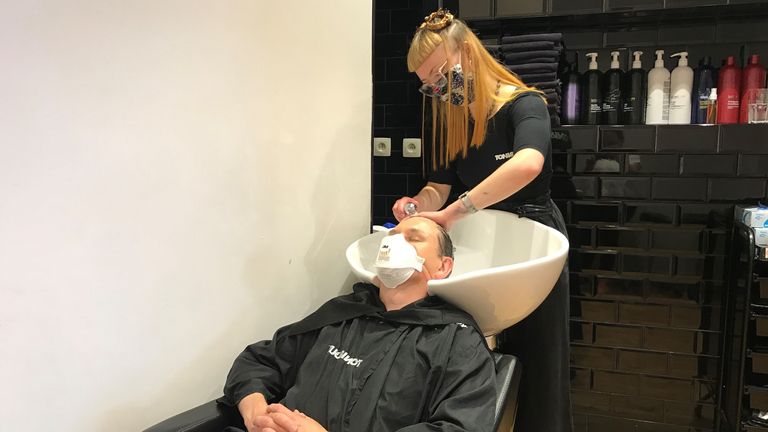
Image: Getting your hair washed is certainly more complicated than before, with mask elastics to contend with
It was only when my hair was actually being trimmed that I realised why people have pined for a visit to the hairdresser.
Even with the curiosities of masks and disinfectant, it had an air of catharsis to it - of grabbing a glimpse of the normal world.
Because it turns out that your first coronavirus lockdown cut is not just about your hair.
It is about something rather more profound.
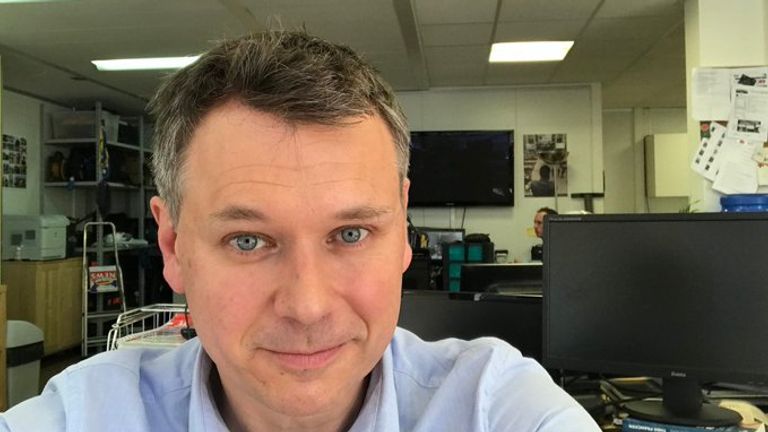 Image: A happy Adam Parsons after his first haircut in more than two months
Image: A happy Adam Parsons after his first haircut in more than two months
Having a haircut takes you back to those days just three of four months ago, before COVID-19 started ripping apart the structure of society and when you could just phone up a salon, or walk into a barber shop, without worrying.
Just like we could get a train, or call a taxi, or walk round the shops, go to football, have friends round for dinner or go to the pub - all the things we took for granted in the past.
As hairdressers opened in Brussels, for the first time in more than two months as lockdowns in Belgium and other European countries ease, I went in with an unruly mop and came out looking neat and tidy.
Just like we have all done a hundred times before... but this time, it really did feel different - weight lifted from my head, but also - very slightly - replaced by a sliver of optimism.
Make no mistake, this was not a haircut as we remember it.
The shop was quieter, with no coffee, no magazines and no waiting around. The hairdresser was wearing both a mask and a visor, and when I put on a gown it was still slightly damp from being disinfected.
Every surface was sprayed and I, of course, was also wearing a mask.
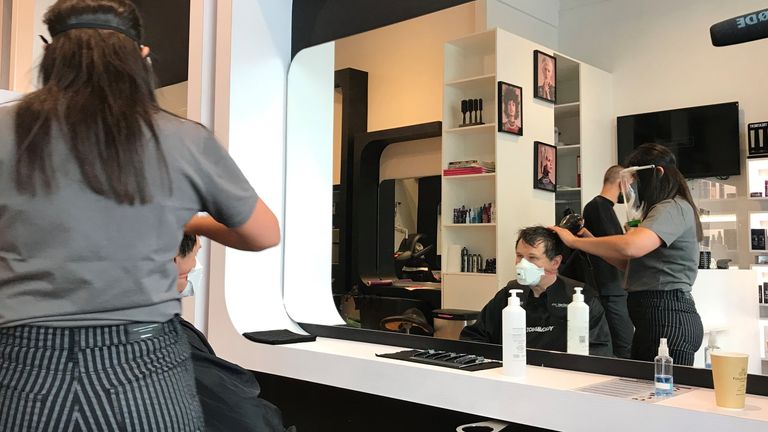 Image:The hairdresser had to look at an unmasked picture of Adam before she cut his hair to see what would suit him
Image:The hairdresser had to look at an unmasked picture of Adam before she cut his hair to see what would suit him
All this does create complications.
For one thing, the elastic band at the back of your mask has to be lowered so that your hair can be washed and cut.
But it has to be lowered, delicately, so that it stays in place.
If the elastic is not strong enough, then the salon has a supply of adhesive tape so that the mask can be held in place, and then elastic bands can be undone.
The protocol is designed so that there is no point when your mouth is uncovered.
It changes the dynamic. The woman who cut my hair, Badra, had to look at an (unmasked) photo of me to work out how best to cut my hair.
Watching her in the mirror, I could not see if she was happy, worried, disappointed, jubilant or bored as she appraised the hairdressing challenge in front of her.
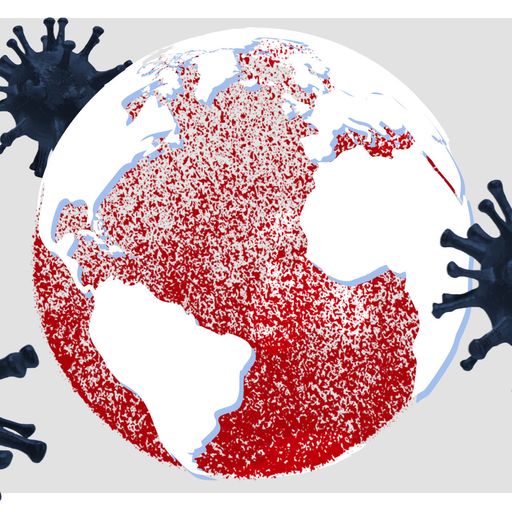
It was only when my hair was actually being trimmed that I realised why people have pined for a visit to the hairdresser.
Even with the curiosities of masks and disinfectant, it had an air of catharsis to it - of grabbing a glimpse of the normal world.
Because it turns out that your first coronavirus lockdown cut is not just about your hair.
It is about something rather more profound.
 Image: A happy Adam Parsons after his first haircut in more than two months
Image: A happy Adam Parsons after his first haircut in more than two monthsHaving a haircut takes you back to those days just three of four months ago, before COVID-19 started ripping apart the structure of society and when you could just phone up a salon, or walk into a barber shop, without worrying.
Just like we could get a train, or call a taxi, or walk round the shops, go to football, have friends round for dinner or go to the pub - all the things we took for granted in the past.
As hairdressers opened in Brussels, for the first time in more than two months as lockdowns in Belgium and other European countries ease, I went in with an unruly mop and came out looking neat and tidy.
Just like we have all done a hundred times before... but this time, it really did feel different - weight lifted from my head, but also - very slightly - replaced by a sliver of optimism.
Make no mistake, this was not a haircut as we remember it.
The shop was quieter, with no coffee, no magazines and no waiting around. The hairdresser was wearing both a mask and a visor, and when I put on a gown it was still slightly damp from being disinfected.
Every surface was sprayed and I, of course, was also wearing a mask.
 Image:The hairdresser had to look at an unmasked picture of Adam before she cut his hair to see what would suit him
Image:The hairdresser had to look at an unmasked picture of Adam before she cut his hair to see what would suit himAll this does create complications.
For one thing, the elastic band at the back of your mask has to be lowered so that your hair can be washed and cut.
But it has to be lowered, delicately, so that it stays in place.
If the elastic is not strong enough, then the salon has a supply of adhesive tape so that the mask can be held in place, and then elastic bands can be undone.
The protocol is designed so that there is no point when your mouth is uncovered.
It changes the dynamic. The woman who cut my hair, Badra, had to look at an (unmasked) photo of me to work out how best to cut my hair.
Watching her in the mirror, I could not see if she was happy, worried, disappointed, jubilant or bored as she appraised the hairdressing challenge in front of her.

Even conversation becomes more difficult, with voices muffled by masks. And conversation revolves around just one topic, of course.
Coronavirus dominates the discourse in Brussels just as much as it does in Britain. There is not much point asking clients about their plans for a summer holiday when, almost certainly, they do not have any.
I was reminded of what an intimate thing a haircut is - of having someone else touching your head, washing your hair and peering at your head from close range.
In a world of social distancing, a haircut does feel completely discordant - almost shockingly tactile.
A lesson of this lockdown has been the amazing speed at which our attitudes can be changed, with the mundane turned into the unlikely.
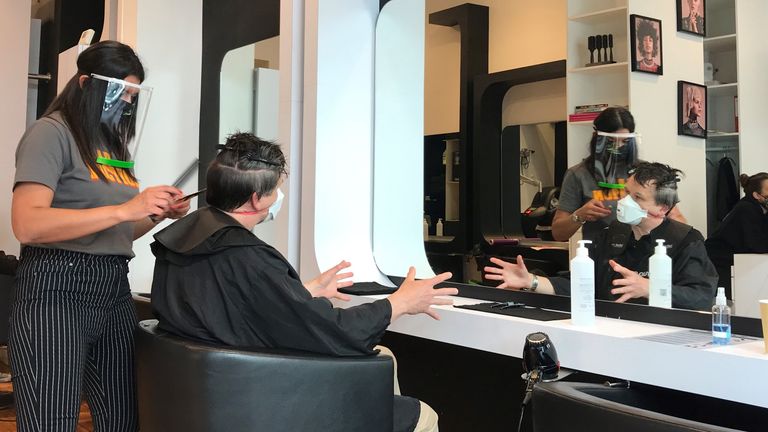 Image: Adam could not see his hairdresser's emotions through her mask and visor
Image: Adam could not see his hairdresser's emotions through her mask and visor
So was it enjoyable? Absolutely.
When I looked in the mirror at the end, I had a flashback to a wave of moments in my past - of the warm glow on your neck after a cut, of looking in the mirror and nodding politely, of never being quite sure what I should say when shown the mirrored reflection of my neck.
All of these things are ephemeral, fleeting memories. But they tell me how much I - and probably you - miss the biorhythm of normal life.
A touchstone, perhaps, a reminder of how the world was and - hopefully - how it will be again before much longer.
Coronavirus dominates the discourse in Brussels just as much as it does in Britain. There is not much point asking clients about their plans for a summer holiday when, almost certainly, they do not have any.
I was reminded of what an intimate thing a haircut is - of having someone else touching your head, washing your hair and peering at your head from close range.
In a world of social distancing, a haircut does feel completely discordant - almost shockingly tactile.
A lesson of this lockdown has been the amazing speed at which our attitudes can be changed, with the mundane turned into the unlikely.
 Image: Adam could not see his hairdresser's emotions through her mask and visor
Image: Adam could not see his hairdresser's emotions through her mask and visorSo was it enjoyable? Absolutely.
When I looked in the mirror at the end, I had a flashback to a wave of moments in my past - of the warm glow on your neck after a cut, of looking in the mirror and nodding politely, of never being quite sure what I should say when shown the mirrored reflection of my neck.
All of these things are ephemeral, fleeting memories. But they tell me how much I - and probably you - miss the biorhythm of normal life.
A touchstone, perhaps, a reminder of how the world was and - hopefully - how it will be again before much longer.



